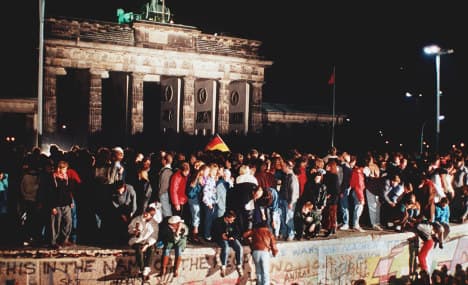German reunification bill hits €2,000,000,000,000

Researchers estimate that 25 years of financial support flowing from the former West into East Germany has cost just under €2 trillion.
In a study commissioned by the Welt am Sonntag, economists at the Berlin-based research association SED-Staat added up all transfers to East German states and individuals since reunification to come up with the astronomical figure.
The difference between the social benefits collected by East Germans and their tax contributions made up the bulk of the price tag at about 60-65 percent of the total, the study showed.
East German states spent about €1.5 trillion more than they would have earned independently, according to the study.
Another €560 billion went straight to East German states and municipalities in the form of direct transfers, such as the German Unity Fund, the Solitary Pacts and the State Financial Equalization system.
Bild newspaper argued on Monday the €2 trillion spent was “worth every cent”.
And criticism of the study came from the state premier of east German state Saxony-Anhalt.
“Instead of recognizing and valuing this as a great feat of solidarity that we have accomplished in Germany, the discussion is being reduced to a one-sided transfer balance sheet," Reiner Haseloff (CDU), told the Mitteldeutschen Zeitung.
But even after 25 years of support, the economic strength of East Germany remains far short of the West.
The Gross Domestic Product per capita (GDP) of East German states remains stuck at two thirds the rate of the West, according to national statistics office Destatis.
And many experts do not expect this situation to change in the near future.
"We're going to have to face up to a future of greater economic differences within Deutschland," Karl-Heinz Paqué, economist and former Finance Minister of Saxony-Anhalt, told the Welt am Sonntag.
Nonetheless, the transfers have allowed poorer states to maintain balanced budgets, invest in infrastructure and assure a higher standard of living to their populations.
SEE ALSO: East Germany in colour - everyday propaganda
Comments
See Also
In a study commissioned by the Welt am Sonntag, economists at the Berlin-based research association SED-Staat added up all transfers to East German states and individuals since reunification to come up with the astronomical figure.
The difference between the social benefits collected by East Germans and their tax contributions made up the bulk of the price tag at about 60-65 percent of the total, the study showed.
East German states spent about €1.5 trillion more than they would have earned independently, according to the study.
Another €560 billion went straight to East German states and municipalities in the form of direct transfers, such as the German Unity Fund, the Solitary Pacts and the State Financial Equalization system.
Bild newspaper argued on Monday the €2 trillion spent was “worth every cent”.
And criticism of the study came from the state premier of east German state Saxony-Anhalt.
“Instead of recognizing and valuing this as a great feat of solidarity that we have accomplished in Germany, the discussion is being reduced to a one-sided transfer balance sheet," Reiner Haseloff (CDU), told the Mitteldeutschen Zeitung.
But even after 25 years of support, the economic strength of East Germany remains far short of the West.
The Gross Domestic Product per capita (GDP) of East German states remains stuck at two thirds the rate of the West, according to national statistics office Destatis.
And many experts do not expect this situation to change in the near future.
"We're going to have to face up to a future of greater economic differences within Deutschland," Karl-Heinz Paqué, economist and former Finance Minister of Saxony-Anhalt, told the Welt am Sonntag.
Nonetheless, the transfers have allowed poorer states to maintain balanced budgets, invest in infrastructure and assure a higher standard of living to their populations.
SEE ALSO: East Germany in colour - everyday propaganda
Join the conversation in our comments section below. Share your own views and experience and if you have a question or suggestion for our journalists then email us at [email protected].
Please keep comments civil, constructive and on topic – and make sure to read our terms of use before getting involved.
Please log in here to leave a comment.